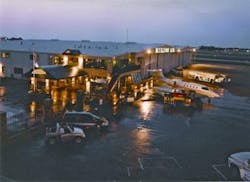EDITOR’S NOTE: As with many aviation families, the change in the business model for fixed base operations, from the traditional ‘Mom & Pop’ to one more focused on business aviation, led to changes for the Jandebeur family at Tulsa International Airport. Twenty years ago, ‘Mom & Pops’ were the norm; today, the business aviation center is. Robert Jandebeur relates the experience of change over the ensuing two decades.
I looked out across the ramp that evening and wondered what things would be like now that we had sold our FBO ... 25 years of 24/7/365 service; the hard work and long hours; the many years of trials and tribulations of dealing with the airport over our lease; the acquisitions of two competitors. We now had the lion’s share of the GA fueling business on the field; fueled 100 airline flights a day; and won the military fueling contract for the third time, which meant we were handling 36 million gallons a year. It had all paid off. We were now a “Top 10” FBO — and in Tulsa, a town of only 500,000.
Had we made a mistake? Was this the best move for the family after all these years? Was there any way our folks could adjust to not working seven days a week? Could I work for somebody else?
FBO Owner - 1975
It all began in the summer of 1975 with the family taking over the leasehold of a very run down FBO which had had numerous operators over the years. We all walked in the first day to a vacant FBO, or so we thought, only to find a lineman behind the front counter who asked, “How can I help you?” Surprised anyone was there, we replied that we were there to take over operations. He explained that he stayed on after the business closed to help provide line service for the few remaining aircraft, and was working for tips. He kept the tug fueled via the local convenience store. He became our first employee.
A couple of years later, we exercised an option to purchase the three hangars from our landlord, Spartan Schools in California. What lay ahead was something we did not expect. When the airport was asked to approve the hangar sale and realized we would be entitled to all the terms written into the lease (dated 1928 and signed by J. Paul Getty and Bill Skelly), things went downhill fast and started an 18-year battle as the airport became determined to negate the lease, in large part, to the “favored nations” clause. We would prevail, but not before spending a half million dollars (the airport spent twice that amount) on legal costs.
With continued repairs and remodeling by the entire family — the folks, three sons, and wives — the business grew from just selling fuel to a flight school and leaseback fleet of 20 aircraft, charter department, aircraft sales of new Mooneys and Pipers, and full maintenance. With five other FBOs on the field, competition was stiff. Then came the ‘80s, and it was only the leadership and patience of our parents, Doug and Joan, that kept us from succumbing to the harsh economic climate. In 1990 we joined the Million Air program and subsequently hit the national publications’ FBO rankings. This inspired the family to raise the bar and again remodel the facility.
In addition to winning the military contract and acquiring the adjacent Signature, things would all begin to fall into place. We now had 23 acres and 175,000 square feet of hangar space, a new 90,000-gallon underground fuel farm (in addition to two existing ones).
The ramp was full. Times were good and we reached out to local charities offering to host events in the hangar. This turned out to be very rewarding, in time raising over a million dollars.
Over time, the family agreed that perhaps the time was right to look at selling. Having real estate investments had taught us to handle the sale as a 1031 exchange and keep Uncle Sam’s share to a minimum.
The good news is I’m still out on ramps across the U.S. Oh, and the folks now only work six days a week.





